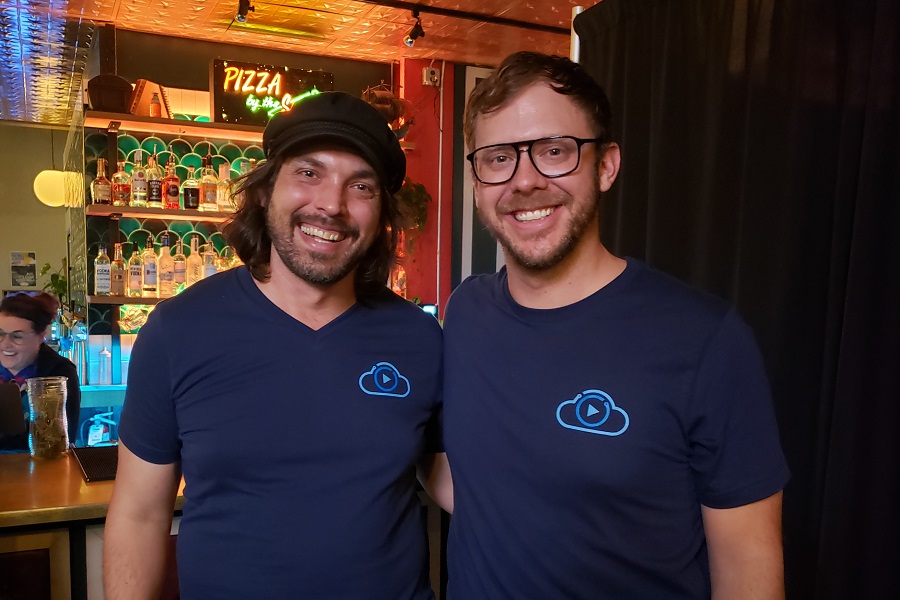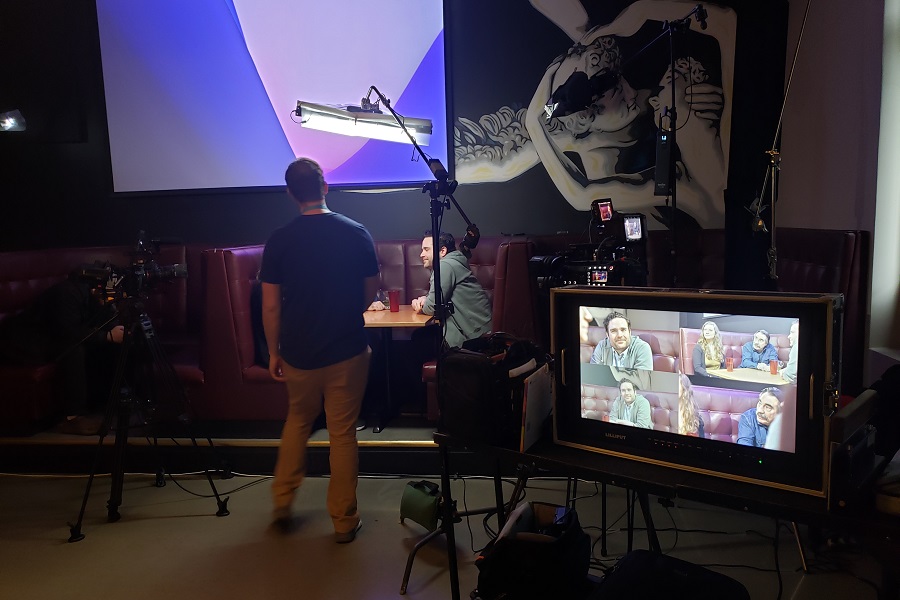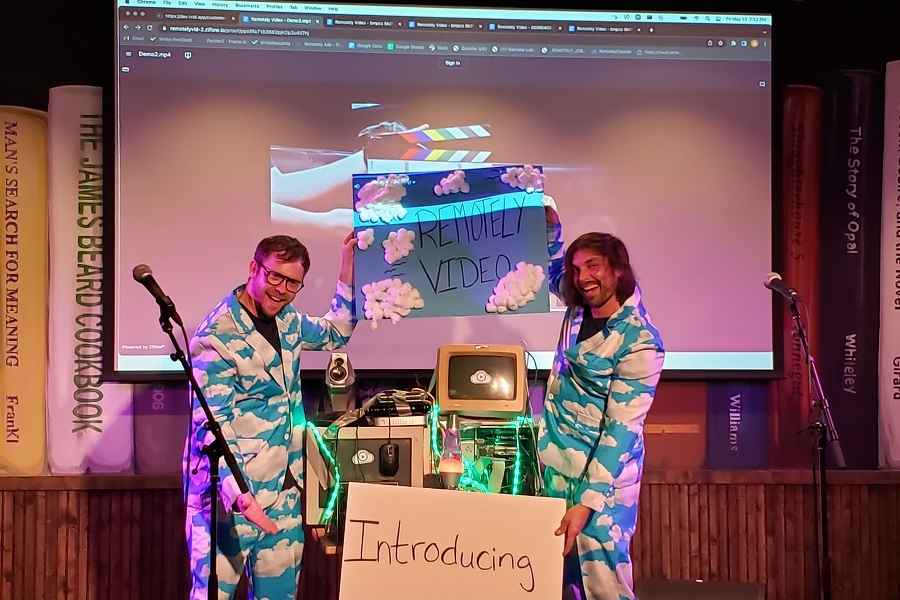Remotely Video’s founders say they’re not looking to replace human film editors, but to reduce production costs and to ‘democratize the overall film industry’
Last week, a Portland-based startup launched the beta version of an artificial intelligence tool that doesn’t do away with human video editors entirely — but could automate the bulk of the postproduction process.
Jeremy Bircher and Jordan Snider, the CEO and CTO of Remotely Video, demonstrated the technology at a packed launch party at Portland’s Revolution Hall Friday, and said the new tool — which has a starting price of $600 — could allow independent filmmakers to compete with large production houses.
The founders set up a film set around one of the restaurant booths. After shooting a short scene with actors, the team invited a photographer in the audience to give a single frame of the raw footage a touch-up to generate a creative “look” for the scene.

Jeremy Bircher and Jordan Snider, the CEO and CTO of Remotely Video. Photo: Sander Gusinow
Remotely uses predictive artificial intelligence to apply coloration, camera balancing and audio editing to raw film footage.
By the end of the night, Remotely had applied the colorist’s decisions to the rest of the scene, as well as cleaned up the audio.
The idea is not to replace human editors entirely, but to cut costs, the founders explained.
Snider says the process could save production houses “days” off their editor’s timeline.
“That’s one less person on your production lot who needs a parking space. One less person who’s going to give everybody COVID,” says Snider. “You’re basically in-studio anywhere in the world now.”
 Remotely Video applies automated post-production to a short scene. Photo Sander Gusinow.
Remotely Video applies automated post-production to a short scene. Photo Sander Gusinow.
Bircher compared the new technology to what happened when home studio recordings became a possibility for bands.
“It wasn’t the exact same quality you would get at a big studio, but you had all this great new music just out in the wild. We’re doing the same thing for filmmakers. Instead of needing to have a relationship with a studio, you’re able to process your own film, nearly at the same quality as the Hollywood process,” says Bircher.
“That’s going to equalize and democratize the overall film industry and make sure a lot more stories get told,” Bircher adds.
The cloud storage system and automated turnaround would also give studios the ability to employ remote crew members. For example, film crew could upload footage to the cloud where an editor across the world could make the color adjustments. In 12 to 24 hours, the AI would colorize and sound edit the daily footage for an executive in Los Angeles or New York to review.
Bircher and Snider co-founded the company when they were desk mates at NXT Lab, a co-working space in Portland. Snider worked as a colorist for major motion pictures and photo retouching artist for 15 years; Bircher is an entrepreneur and video producer whose work includes documentaries and ad campaigns.
When they met, Bircher happened to be working on a way to automate the audio mixing process and Snider was developing an AI system to automate the coloration process.
“He was the desk next to mine and we started talking all about postproduction,” says Bircher. “He was working more on the colorist side, myself on the audio and soundtrack side, and we had a lot of great conversations about the industry and our shared love of the creative process. We really linked up as friends.”
In 2021, Remotely was a finalist in Angel Tech Oregon, a grantmaking fund opportunity funded by the Oregon Entrepreneurs Network.
Once an editor makes changes to one frame of the video, Remotely’s machine learning algorithm compares the raw and touched footage to a database of thousands of previous edited and unedited film pairs and applies the adjustments to the rest of the video.
According to Remotely head of sales Caspian Alderman, the system automates the most time and labor-intensive part of the video production process.
“Maintaining like the postproduction workflow and infrastructure is the single biggest hurdle for people creating videos,” says Alderman. “We have like a turnkey solution. All you have to do is deliver your footage to us digitally or even physically if you need to, then your proxies and dailies are going to come online within 24 hours in a way that can be shared with everyone you’re collaborating with no matter where they happen to be. It’s like pressing the ‘easy button’ for professional quality videos.”
The process does have the capacity to make errors, which is why the Remotely team reviews all finished products prior to resending. In addition to a $600 “one-off” charge to use Remotely, customers will also be able to purchase a subscription model.
At the time of launch, Remotely only had one client, Only Today, an Emmy-Award-winning production house in Portland. The relationship helped Remotely test its technology on commercial productions prior to its official beta launch. Remotely is currently seeking beta testers for the product, according to the company’s website.
For local filmmakers, the concept of cheaper, faster post-production means a potentially closing the quality gap with large studios.
 Ime Etuk at the Remotley Video Launch Party. Photo: Sander Gusinow
Ime Etuk at the Remotley Video Launch Party. Photo: Sander Gusinow
“Postproduction is a big part of filmmaking and if there’s a way to simplify it and make it more cost-effective then definitely I’m going to use it,” says Ime Etuk, a Portland-based film director at the launch event who has directed commercials, movies, music videos, and worked on Portland-filmed comedy series ”Shrill.”
“If there’s ways to keep quality high and bring costs down it means more can go on the screen. As a producer, any time I can put more money on the screen that means I have added more value,” Etuk adds.
Etuk says he is shooting an independent film in Oregon over the summer, and that he is considering using Remotely for postproduction work. If the technology can deliver on its promise, Etuk says it would be “huge” for independent filmmakers.
“It’s checking all the boxes for deliverables to all the bigger studios you want to sell to.If this technology can help you get to the finish line earlier, you can get distribution and sales earlier, which is pretty great for independent film,” Etuk says.
To subscribe to Oregon Business, click here.





